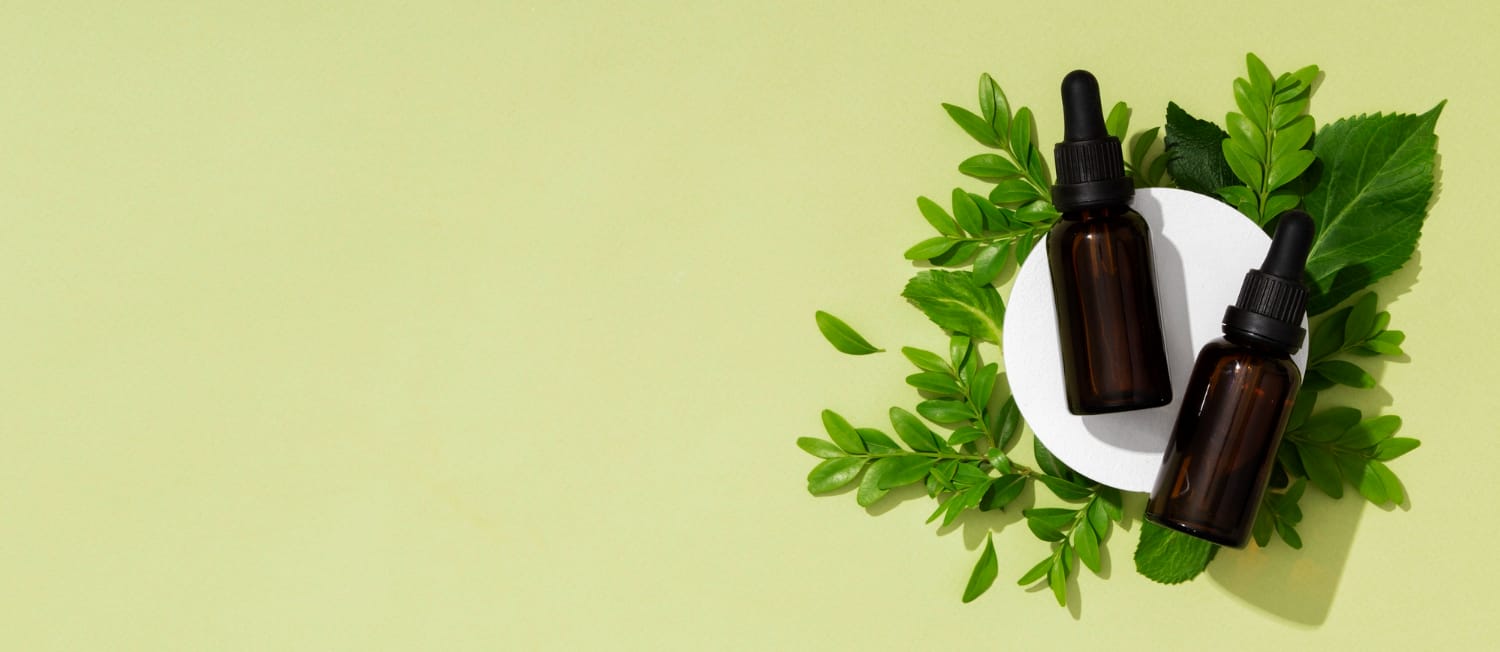Neem, scientifically known as Azadirachta indica, is a tree native to the Indian subcontinent. It has a rich history and has been highly regarded in traditional Ayurvedic medicine for centuries, featuring prominently in ancient Indian texts dating back thousands of years. The earliest documented mention of neem is in ancient Tamil texts such as the Thirumular Thirumantiram-Ennayiram, Tholkappiam, and the ancient Tamil works of Sangam literature. Neem continued to be revered in Indian culture and has been highlighted in the classical Ayurvedic texts of Charaka Samhita and Susruta Samhita. Referred to in Indian folklore as the “village pharmacy” due to its diverse medicinal properties, neem oil has a wide range of therapeutic applications that we are still exploring today. [1]
Neem Oil For Skin

1. Insect repellent
Neem oil has insecticidal properties that can help repel mosquitoes, flies, ticks, fleas, and other pests that can bite or irritate the skin. Research suggests that neem has natural insecticidal properties, making it a natural pest control treatment that can also work to prevent bites when applied over the skin. This is why many Ayurvedic skin creams that contain neem oil also work as insect repellents. [2]
2. Scabies
A parasitic infection that is common in babies and children, scabies are tiny mites that can infest the skin, causing intense itching and inflammation. These symptoms appear as the mites burrow into the skin and lay their eggs. Studies have found that neem oil and other neem extracts may fight scabies infestations and provide relief. [3]
3. Psoriasis & Eczema
Neem oil can help relieve the symptoms of eczema and psoriasis, which are chronic inflammatory skin conditions that cause dryness, itching, scaling, redness, and cracking of the skin. Neem oil can help moisturize, soothe, and repair the damaged skin barrier, as well as reduce inflammation and infection. [4]
4. Ringworm
Neem oil has antifungal properties that can help treat various fungal infections of the skin, such as ringworm, athlete’s foot, jock itch, and nail fungus. It works by disrupting the cell membrane and growth of the fungi, as well as enhancing the immune system’s ability to fight off the infection [5]
5. Anti-ageing effects
Neem oil can help fight the signs of aging by stimulating the production of collagen and elastin, which are proteins that give the skin its structure and elasticity. Collagen and elastin levels decrease as we age, leading to sagging, wrinkling, and thinning of the skin. Neem oil application was found to not only boost collagen and elastin production but also increase protection against UVB radiation. [6]
6. Wound Healing
The use of neem oil for skin damage can help speed up the healing process of cuts, scrapes, burns, or insect bites by promoting blood circulation and tissue regeneration. It also has antiseptic and analgesic properties that can prevent infection and relieve pain. Neem oil can also reduce scarring by preventing excessive formation of collagen at the wound site [7]
7. Skin Toxicity
Neem oil application may also help treat exposure to toxins as there is evidence showing that gels containing neem oil could even reduce toxicity from radiation therapy in cancer patients. Although this was a small study involving just 28 subjects, all patients experienced a reduction in skin toxicity. [8]
8. Fighting Skin Infections
Neem oil has anti-inflammatory and antibacterial properties that can help fight acne-causing bacteria as well as other skin infections. Researchers observed these benefits in cosmetic products and Ayurvedic soaps containing neem oil and other neem extracts 9. Other studies have also reported in vitro antiviral activity of neem against the Herpes simplex virus type-1 (HSV-1). [10]
Neem Oil For Hair
1. Fights Hair Lice
Neem oil is an effective natural remedy for treating head lice infestations. Its strong insecticidal properties can help to destroy not just lice, but also their eggs. This is essential to control any hair lice infestation. Research shows that neem oil and seed extract can kill head lice larvae within just 5 minutes and fully grown lice within 10 minutes. These benefits are linked to the presence of azadirachtin. [11]
2. Fights Dandruff
Neem oil has anti-inflammatory and antibacterial properties that can help reduce the inflammation, itching, and flaking of the scalp caused by dandruff. It also helps prevent dandruff-causing bacteria and fungi from spreading. These benefits of neem oil for dandruff are linked to the presence of Neem’s active ingredient nimbidin. [12]
3. Moisturizes The Scalp
Neem oil is rich in fatty acids, such as oleic, linoleic, and palmitic acids, which nourish and moisturize the hair. It also contains vitamin E, which is an antioxidant that protects the hair from environmental damage and prevents moisture loss. Neem oil can help hydrate and soften dry, brittle, or frizzy hair.
4. Heals Scalp Infections
Neem oil has antifungal and antiseptic properties that can help treat various scalp infections, such as ringworm, folliculitis, or seborrheic dermatitis. It works by killing the infection-causing microorganisms and soothing the irritated skin. Neem oil can also prevent scarring and promote wound healing on the scalp
5. Promotes Hair Growth
Neem oil can help promote hair growth by activating the dormant hair follicles and increasing the anagen phase of the hair cycle. The anagen phase is the active growth phase of the hair, during which new cells are added to the hair shaft. Neem oil can also provide essential nutrients to the hair follicles, such as fatty acids, antioxidants, calcium, and limonoids
6. Prevents Premature Greying
Neem oil can help prevent or delay the appearance of grey hair by preserving the natural pigment of the hair. It does so by inhibiting the activity of an enzyme called tyrosinase, which is responsible for the production of melanin, the pigment that gives the hair its color. Neem oil can also nourish and condition the hair, making it look shiny and healthy [13]
7. Increases Hair Lustre
Neem oil enhances the natural shine and luster of the hair. Its moisturizing properties help repair damaged hair cuticles, smoothing the hair shaft and imparting a healthy shine. Regular use of neem oil can revive dull and lifeless hair, making it appear vibrant and glossy.
How to use neem oil [1][14]
How to use neem oil for skin
- Due to its anti-viral properties, Smallpox, chicken pox, and warts have traditionally been treated with a paste of neem oil—usually rubbed directly onto the infected skin.
- Neem oil is a vegetable oil that is obtained through cold pressing of the plant’s fruits and seeds. Nevertheless, neem oil can be further processed using different solvents to create a variety of extracts that are used in preclinical and clinical research afterward. These extracts are also used in various cosmetic products.
- The oil is used to treat skin diseases such as scrofula, indolent ulcers, and ringworm when applied topically.
- Acne, psoriasis, eczema, ringworm, and even stubborn warts are among the conditions that can clear up easily when high-quality, organic neem oil is used.
How to use neem oil for hair
In India and Bangladesh, villagers apply neem oil to the hair to kill head lice, reportedly with great success.
Side effects of neem oil [15]
Ingestion of neem oil can cause these side effects:
- Vomiting
- Drowsiness
- Diarrhea
- Seizures
- Metabolic acidosis
- Altered sensorium
- Reye-like syndrome
- Nephrotoxicity
Neem leaf or oil ingestion is contraindicated in pregnancy, lactation, and children under 12 years.
Conclusion
To safely enjoy these neem oil benefits for hair and skin care, make sure to dilute neem oil with a carrier oil like coconut, jojoba, or almond oil before applying it to your scalp or skin. This is important because neem oil is highly potent and if used in a concentrated form can cause adverse reactions.
FAQs
1. Does neem oil lighten skin?
Neem oil is not meant to lighten skin, but it can give an even skin tone as it fights hyperpigmentation by inhibiting melanin and tyrosinase 13.
2. Can I apply neem oil directly on my face?
Neem oil is safe for application on your skin including the face, but it is advisable to use highly diluted or organic cold-pressed neem oil. As neem oil is highly potent, even when diluted, make sure to first do a test patch on a small area of skin.
3. What are the side effects of neem oil?
Neem oil is usually safe but can cause serious side effects if ingested. This risk is especially high for infants and small children.
References:
- Neem
- Evaluation of the Repellency Effect of Neem (Melia azedarach) Plant Extracts Based on the Mittler & Dadd Method
- In-Vivo Effectiveness of 5% Azadirachta indica Oil Cream as Anti-Scabies
- Aqueous extract of neem leaves in treatment of Psoriasis vulgaris
- ANTIFUNGAL ACTIVITY OF NEEM (Azadirachta indica: MELIACEAE) EXTRACTS AGAINST DERMATOPHYTES
- Topical application of neem leaves prevents wrinkles formation in UVB-exposed hairless miceTopical application of neem leaves prevents wrinkles formation in UVB-exposed hairless mice
- EVALUATION OF THE WOUND HEALING ACTIVITY
- Hypericum perforatum and neem oil for the management of acute skin toxicity in head and neck cancer patients undergoing radiation or chemo-radiation: a single-arm prospective observational study
- Inhibitory effects of Azadirachta indica secondary metabolites formulated cosmetics on some infectious pathogens and oxidative stress radicals
- In vitro antiviral activity of neem (Azardirachta indica L.) bark extract against herpes simplex virus type-1 infection
- Ovicidal effects of a neem seed extract preparation on eggs of body and head lice
- Nimbidin suppresses functions of macrophages and neutrophils: relevance to its antiinflammatory mechanisms
- Azadirachta indica (Neem) Water Leaf Extract Inhibits Melanin Production and Tyrosinase Activity in B16F10 Melanoma Cells
- Neem: A Tree for Solving Global Problems.
- Neem in dermatology





















I think you have noted some very interesting points, thanks for the post.
This really answered my drawback, thanks!